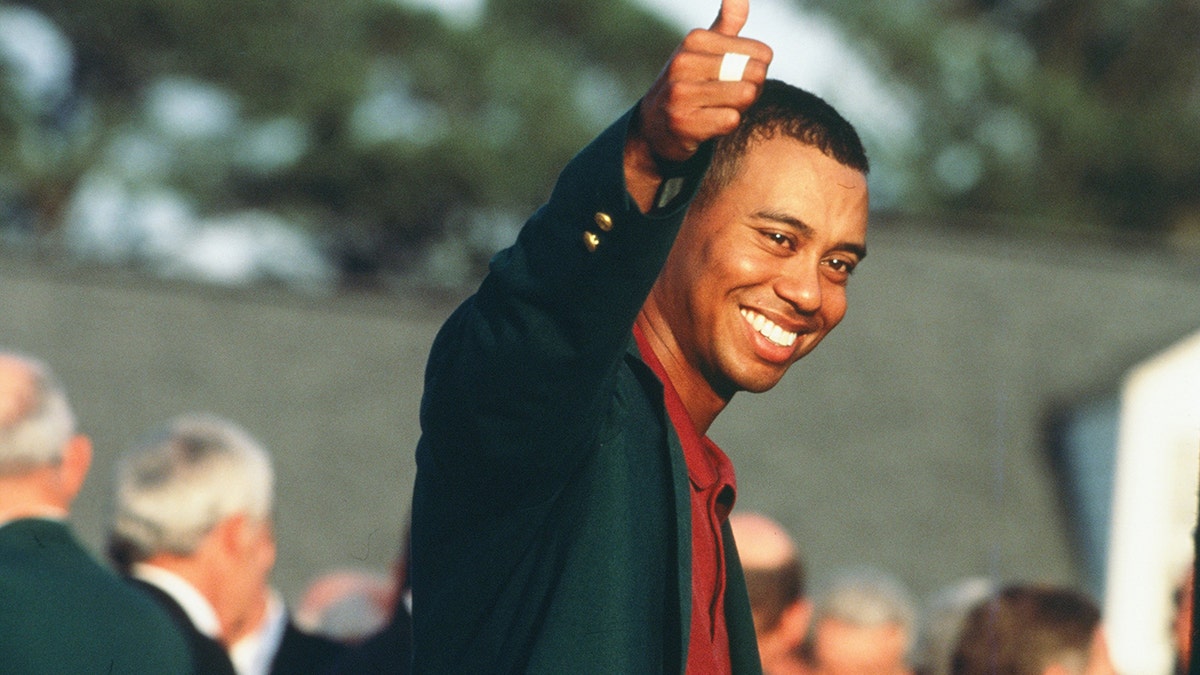Golf fans rooting for Tiger Woods Masters miracle
OutKick founder Clay Travis breaks down the chances of the golf legend performing well in the Masters a year after his serious car accident.
Outstanding golfer and iconic athlete Tiger Woods has said he intends to play at the Masters in Augusta, Georgia, this week, as millions of avid sports fans know well.
This comes more than a year after Woods suffered devastating leg injuries in a car crash in Los Angeles.
ETIQUETTE EXPERT SAYS BRUCE WILLIS' DIAGNOSIS REMINDS US WHAT TO SAY, NOT SAY, WHEN OTHERS ARE ILL
The Masters begins Thursday, April 7, and runs through Sunday, April 10. The event is one of pro golf's most prestigious events of the year, and Woods gave a press conference earlier this week to share his intentions.

In this image, Tiger Woods watches his drive on the sixth hole during round-robin play at the Dell Technologies Match Play Championship golf tournament, on Friday, March 29, 2019, in Austin, Texas. (AP Photo/Eric Gay)
The reemergence of Tiger Woods is significant not just because he's defied the odds in terms of his physical recovery and a return to professional sports, but also because Woods hasn’t competed in a high-level golf competition since the Masters two years ago in 2020.
"Be careful about using sarcastic humor," said Jacqueline Whitmore, etiquette consultant and speaker.
His return is sparking conversation: When someone in our lives disappears for a while — for an injury, an illness, a leave of absence, or some other reason that may or may not be health-connected — then returns, what do we say to that person?
ETIQUETTE EXPERT SAYS WE'VE OVERLOOKED LADY GAGA'S GREAT KINDNESS TOWARD LIZA MINNELLI
How do we properly welcome people back into the workplace or the community? What shouldn't we say or do on a personal level?

Tiger Woods speaks during his induction into the World Golf Hall of Fame on Wednesday, March 9, 2022, in Ponte Vedra Beach, Fla. (AP Photo/Gerald Herbert)
In other words: In 2022, what's the appropriate etiquette? (In post-COVID lockdown times, this issue has also come up.)
Fox News Digital asked Florida-based Jacqueline Whitmore, whose focus is etiquette both as a business owner and as a consultant, for insights and suggestions about handling the issue.
What to say when someone returns
"For someone who’s reemerged on the scene after an illness, injury or time-off period," said Whitmore, "the following comments would be very appropriate."
"Hey, it’s great to see you back."
"We missed you and we’re glad you’re back."
"If you know the person well, extend a hug and simply say, ‘Good to see you.’ When in doubt, take your cues from the other person."
"We’re grateful to have you back."
"We’re so thankful for your recovery!"
"Take the time you need to settle in and get back up to speed."
Added Whitmore, "Treat the person the way" you believe he or she would like to be treated, based on how well you know the person and in line with whatever environment you're in on this occasion — the workplace, your home community, your local neighborhood, etc.
"If you know the person well," she said, "extend a hug and simply say, ‘Good to see you.’ When in doubt, take your cues from the other person."
What not to say when someone returns
"Be careful about using sarcastic humor," Whitmore pointed out about the situation.
Comments to other people just back on the scene — whether those comments are made in jest or not — such as, "We were wondering if you were ever coming back!" or "Did you enjoy your ‘vacation'?" can be perceived as offensive in some situations, she said.

Tiger Woods during the presentation ceremony of the 2002 Masters Tournament in Augusta, Georgia. (Augusta National/Getty Images)
"Even though you might be saying things like this in jest," noted Whitmore, "the other person might not find it so humorous."
Whitmore also advised avoiding probing personal questions such as the following:
"Where were you?"
"What happened?"
"Is everything OK?"
Other bits of wisdom: Be empathetic and offer kindness to a person who may not yet be fully recovered.
In other words — "Don’t pester someone for an explanation," she said.
Neither should you ask for medical or personal details, in most cases.
"The person will volunteer the information" if he or she chooses to and "believes it's your business," she added.

Golfing great Tiger Woods pauses during a press conference after he played in the JP McManus Invitational Pro-Am at Adare Manor, in Limerick, Ireland, on Tuesday, July, 6, 2010. (AP Photo/Peter Morrison)
Other bits of wisdom: Be empathetic and offer kindness to a person who may not yet be fully recovered.
Also, respect the individual's privacy.
"Allow the person to talk as little or as much about his or her absence," she said.
And consider lending the person a helping hand. Offer to assist if someone needs help, while taking cues from the person as to whether such help is welcome or not.
CLICK HERE TO GET THE FOX NEWS APP
Whitmore is founder of The Protocol School of Palm Beach, a premier business etiquette and hospitality consulting firm in Florida; her website is etiquetteexpert.com.
Ryan Gaydos of Fox News contributed reporting to this article.










































